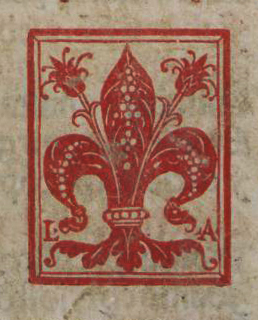
Back Giunta (Buchdrucker) German Giunta (impresores) Spanish Giunta (imprimeurs) French Giunti család Hungarian Giunti (stampatori) Italian Giunta Swedish Джунті (видавці) Ukrainian
| Giunti | |
|---|---|
 The Florentine giglio, printer's mark of Lucantonio Giunti, from a missal printed in Venice in 1521 | |
| Earlier spellings |
|
| Place of origin | Republic of Florence |
| Members | List
|

The Giunti were a Florentine family of printers.[a] The first Giunti press was established in Venice by Lucantonio Giunti, who began printing under his own name in 1489.[1] The press of his brother Filippo Giunti (1450–1517) in Florence, active from 1497,[2]: 338 was a leading printing firm in that city from the turn of the sixteenth century.[3]: 31 Some thirty members of the family became printers or booksellers. A press was established in Lyon in 1520. By about 1550 there were Giunti bookshops or warehouses in Antwerp, Burgos, Frankfurt, Lisbon, Medina del Campo, Paris, Salamanca and Zaragoza,[1] and agencies in numerous cities of the Italian peninsula, including Bologna, Brescia, Genoa, Livorno, Lucca, Naples, Piacenza, Pisa, Siena and Turin, as well as the islands of Sardinia and Sicily.[4]: 174
In Venice the Giunti press was the most active publisher and exporter of liturgical texts in Catholic Europe.[5]: 159
In Florence the Giunti sought an effective monopoly of music-printing. Prominent in the output of the press are bandi and laws promulgated by the Grand Dukes of Tuscany, for whom the Giunti operated virtually as an official press.
The classic bibliographic monograph, De Florentina luntarum typographia by Angelo Maria Bandini,[6] details the output of the press at Florence by year from 1497 to 1550. Bandini was able to build upon a printed catalogue of 1604.[7]
After the death of Bernardo in 1551, the presses continued to be operated by their heirs. The most famous book published by the Giunti is the second edition of the Lives of the Most Excellent Painters, Sculptors, and Architects by Giorgio Vasari in 1568.
Cite error: There are <ref group=lower-alpha> tags or {{efn}} templates on this page, but the references will not show without a {{reflist|group=lower-alpha}} template or {{notelist}} template (see the help page).
- ^ a b Cite error: The named reference
treccwas invoked but never defined (see the help page). - ^ Cite error: The named reference
pettaswas invoked but never defined (see the help page). - ^ Cite error: The named reference
carterwas invoked but never defined (see the help page). - ^ Cite error: The named reference
pettas2was invoked but never defined (see the help page). - ^ Cite error: The named reference
halewas invoked but never defined (see the help page). - ^ Cite error: The named reference
bandiniwas invoked but never defined (see the help page). - ^ Cite error: The named reference
catwas invoked but never defined (see the help page).
© MMXXIII Rich X Search. We shall prevail. All rights reserved. Rich X Search